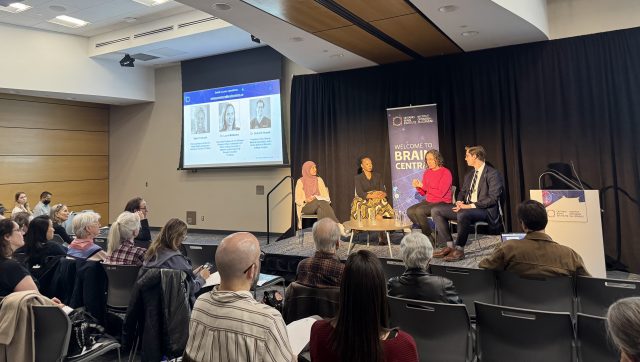Caring for your brain health and mental well-being is just as important as looking after your physical health.
OBI’s brain tips offer simple solutions that can be implemented in daily life to nurture brain health and support yourself or your loved ones.
Here are six tips on how to take care of your brain.
Sleep: A routine can improve your sleep. Stick to a sleep schedule and create a quiet, dark and comfortable space. Minimize stimulation and do things that help you wind down, such as taking a bath or reading a book.
Relax: Recognizing stress and training yourself to relax can help you manage difficult situations. It is important to find coping strategies that work for you. Meditate or engage in an activity you enjoy, such as listening to music.
Think: Train your brain every day! Learn a new language or musical instrument. Developing a new skill is more beneficial than doing something familiar.
Eat: Support a healthy brain with a diet rich in fruit and vegetables, and in fish that is high in Omega-3 fatty acids, such as salmon.
Move: Want to reduce your risk of developing Alzheimer’s disease? Exercise regularly! Older adults who are physically active are almost 40% less likely to develop Alzheimer’s disease than those who are inactive.
Play: Schedule a social interaction each week: video chat with a distant friend, call your mom or join an online book club.
The Ontario Brain Institute proud to support and collaborate with community groups, researchers, clinicians and companies, through our various programs and initiatives at OBI, to help bring lab to life.
While we are pleased to share these brain health tips with you, they are not meant to replace urgent care. If you are struggling with your health and require immediate support, call 911. You can also find a list of mental health outreach services available at https://www.ontario.ca/page/mental-health-services.
RESOURCES
Sleep:
Relax:
-
- Public Talk – Mindfulness in Stressful Times
- Public Talk: Promoting Mental Wellness in Indigenous Communities
- Public Talk – Can Meditation help us with Stress?
- Webinar – Taking Care of Mind, Body and Soul during COVID-19
- Blog – Don’t Worry, Be Happy
- Article – Cultivating mindfulness during a pandemic
- Video – COVID-19 mental health coping series
Think:
-
- Articles – Photography workshops teach Indigenous youth to speak with vision
- Article – Why culture is key to Indigenous mental health
- Public Talks: Taking Charge of your Brain Health
- Public Talks: Three Brains. Three Lives. Three Stories
- Public Talk: Promoting Mental Wellness in Indigenous Communities
- Blog – Brain Games Help You Gain
Eat:
Move:
-
- Public Talk: Movement for Brain Health
- Public Talk: Finding Meaning in Movement
- Public Talk – How Does Physical Activity Improve Well-Being?
- Public Talk – Enhancing the physical activity and health of children/youth with neurodevelopmental disorders
- Blog – Walking Away From Dementia
- Blog -This is your brain on exercise
- Blog -Exercise as medicine
- Blog -Take Your Brain for a Walk
- Blog – Physical activity protects us from losing brain function
- Toolkit – Physical Activity and Alzheimer’s Disease Toolkit
- Video – How Does Physical Activity Improve Well-Being?
Play:
SUPPORTING MATERIALS
-
- Guide- The CHOICE-D Patient and Family Guide to Depression Treatment
- Podcast – Neuroplasticity, psychedelics and the latest in depression research
- Article – Ketamine offers new hope for patients with severe depression
- Article – How old drugs can lead to new treatments for mental illness
- Article – Can Depression Be Diagnosed With A Blood Test?
- Article – What are the ‘F-words’ of childhood disability?
- Public Talk – Old Drugs, New Uses
- Video – My Life with Depression – Andrew K.



